Student ambassadors are more than just friendly faces on a campus tour; they’re living, breathing stories of what it’s really like to study at your institution. Whether they’re current students or recent alumni, they give prospects something no brochure or ad campaign can match: authenticity.
Today, that authenticity is going digital. Many institutions are now recruiting digital student ambassadors who meet prospects where they already spend most of their time, on social media, in live chats, and across online communities.
So, why does this matter? Because ambassadors humanize your school’s brand. They answer questions honestly, share glimpses of daily life, and help prospects picture themselves as part of the community. For Gen Z, especially, that peer-to-peer connection is gold. A relatable student voice can often be far more persuasive than a polished marketing message.
As we’ll see, many of the qualities and characteristics of a student ambassador remain constant, but success in the digital realm also requires some special skills. Let’s start with the basics – what exactly does a student ambassador do, and how would we describe this role?
What Is a Digital Student Ambassador?
How would you describe a student ambassador? A student ambassador is a representative of their institution who shares authentic experiences, supports prospective students, and fosters a welcoming community. They act as a bridge between the school and its audience, answering questions, giving insights, and promoting campus culture through personal interaction, events, and digital engagement.
On digital channels, these ambassadors take on a new kind of role: becoming micro-influencers for your school. They showcase campus moments on Instagram Stories, upload vlogs to YouTube, or join discussion threads to help someone halfway around the world decide whether your school is the right fit.
And here’s where “digital” makes the difference. Traditional ambassadors focus on in-person tours, open houses, and campus events. Digital ambassadors bring that same personal touch into the online world. They host live Q&As, post blogs or videos, and respond to inquiries on platforms like Unibuddy, connecting with prospects who may never set foot on campus before applying. For international or out-of-town students, these online connections can be the deciding factor. The best blend is the warmth of a welcoming peer with the creativity and consistency of a skilled content creator.
Digital Student Ambassador Responsibilities:
- Welcoming and Touring Visitors: Ambassadors guide campus tours, share personal stories, and help visitors envision themselves as part of the community. They may host “shadow days,” lead Q&A panels at open houses, or ensure new students feel at ease during orientation.
- Outreach and Communication: Many connect directly with prospects through calls, emails, and social media. They answer questions, follow up with applicants, or even make congratulatory calls to admitted students. Some take over institutional Instagram accounts or host live Q&A sessions, providing candid insights into academics, housing, and student life.
- Event Support and Promotion: Ambassadors often help plan and run recruitment events, student panels, and webinars. They may work with faculty to coordinate workshops or invite speakers from student services, bringing a student-led energy to every event.
- Content Creation and Storytelling: Today’s ambassador programs frequently include content production. Students might write blogs, create videos, or manage social media takeovers to highlight campus life.
- Peer Advising and Support: Beyond recruitment, ambassadors mentor new and younger students, answer parent questions, and direct peers to campus resources. In certain settings, such as K-12 schools or community programs, they may lead workshops or classroom discussions.
- Bridge Between Students and Administration: Ambassadors also act as liaisons, communicating student feedback to staff and reinforcing institutional values within the student body. This two-way role supports a stronger campus culture and understanding.
Ultimately, the role is about representing the school’s values and culture through genuine, student-to-student engagement. As one Higher Education Marketing advisor explains, “Students want to see themselves in your school’s marketing material”, and ambassadors make that possible.
Whether volunteer or paid, ambassadors gain significant benefits: leadership and communication skills, valuable networking, and a stronger sense of belonging. Many describe the experience as a highlight of their education, one that builds confidence and allows them to give back to their community.
The Rise of the Digital Student Ambassador
The student ambassador role isn’t new, but the way it’s delivered has changed dramatically. Today, many of those warm, peer-to-peer conversations that once happened during campus tours now take place entirely online. That’s where the digital student ambassador comes in.
What is a digital ambassador? A digital ambassador is a student representative who promotes their institution online through social media, live chats, and virtual events. They share authentic experiences, answer questions, and create engaging content, helping prospects connect with the school community, even if they can’t visit campus in person.
The job is the same at its core: share genuine student experiences and help prospects imagine themselves at your school. But instead of shaking hands at an open house, digital ambassadors are hosting live virtual tours, answering questions in chat rooms and giving followers a real look at campus life through Instagram, TikTok, or YouTube. For many prospects, especially those researching from halfway around the world, this might be their very first interaction with your institution. That’s why the role is so powerful. Here are the top characteristics of a student ambassador:
Communication That Connects Through a Screen
Speaking to a room is one thing. Making someone feel welcome through a camera or a line of text is another. Digital ambassadors need to master both. They know how to keep responses clear, friendly, and relatable, whether that’s through a quick message in a DM, a 30-second Instagram Story, or a thoughtful blog post. They understand tone, timing, and even how the right emoji can make an online exchange feel personal.
Self-Motivation in a Flexible Role
Unlike traditional ambassadors who work during scheduled tours or events, digital ambassadors often manage their own hours. They might respond to a question late in the evening, keep up with multiple conversations across platforms, or check in with an international prospect in a different time zone. That means self-motivation is of extreme importance. The best digital ambassadors don’t wait for prompts. They’re proactive about reaching out, following up, and making sure no question goes unanswered.
Tech-Savvy and Adaptable
A digital ambassador’s toolkit can change from one day to the next. One moment they’re editing a TikTok video, the next they’re co-hosting a Facebook Live Q&A or answering questions in a university’s custom chat app. They’re comfortable switching platforms, solving small tech issues, and adapting quickly when something unexpected happens. They also understand how to use each channel’s strengths to create the most impact, whether that’s a quick selfie video for a personal touch or a detailed written reply for complex questions.
Bringing Energy Online
Here’s the challenge: online, you don’t have the buzz of an in-person conversation to carry you. That means enthusiasm has to work harder. The best digital ambassadors make their passion for the school shine through in every message, video, or post. Research backs this up: positive, genuine interactions between current and prospects are one of the biggest drivers of enrollment conversions.
To recap, what makes a good ambassador? A good ambassador is authentic, approachable, and knowledgeable, with strong communication skills. They represent their institution with enthusiasm, build trust through genuine connections, and adapt easily to different audiences and platforms, ensuring every interaction leaves a positive, lasting impression.
In essence, a digital student ambassador is more than a student with social media skills. They’re a trusted peer, a skilled communicator, and a tech-savvy connector who can make a prospect feel seen, heard, and excited, no matter the distance. Schools that invest in them aren’t just extending their reach; they’re deepening their influence from the very first interaction.
Key Qualities of a Great Student Ambassador
What separates a good student ambassador from a truly exceptional one? Whether they’re greeting visitors in person or connecting with prospects online, the standouts share a set of defining qualities that make them unforgettable.
Communication That Connects
Great ambassadors are master communicators. They’re equally skilled at chatting one-on-one with a shy high school student or presenting to a room full of parents. They don’t just speak; they listen. They pick up on unspoken concerns, ask clarifying questions, and tailor their responses so every prospect feels understood. In a digital context, this means writing with warmth and clarity; friendly enough to spark conversation, yet concise enough to respect attention spans. They adapt effortlessly: a casual tone on Instagram, a polished one in email, and an authentic voice in video.
Positivity That’s Contagious
An ambassador’s outlook shapes a prospect’s first impression of the school. The best ones radiate genuine enthusiasm, never forced, never “salesy.” Their love for the institution is real, and it shows in every conversation, every smile, and every story they share. Admissions teams often spot potential ambassadors by noticing who already volunteers for events or naturally promotes their campus. Enthusiasm is magnetic: when an ambassador talks about their favorite class or a beloved campus tradition, that excitement becomes impossible to ignore.
Initiative and Leadership in Action
True leaders don’t wait for instructions; they step in. Exceptional ambassadors are proactive, spotting the student standing alone at an event and striking up a conversation, or jumping in to answer an unanswered question in a group chat. They embody self-discipline, integrity, and the ability to make others feel welcome. For digital ambassadors, initiative is non-negotiable. They must work independently, manage their time, and seize every opportunity to engage.
Inclusivity and Empathy
Great ambassadors make every prospect feel like they belong. They’re culturally aware, sensitive to differences, and skilled at connecting across backgrounds. They know what it’s like to be the newcomer, uncertain, maybe even overwhelmed, and they respond with patience and understanding. Whether reassuring an international student about campus diversity or helping a first-generation applicant navigate the admissions process, they create an atmosphere of welcome and respect.
Professionalism You Can Count On
While the role is peer-driven and personable, it’s also a serious responsibility. Ambassadors represent the school’s brand, and reliability is key. That means showing up on time, honoring commitments, and maintaining a respectful, professional demeanor, even in casual interactions. Digital ambassadors, in particular, must be disciplined enough to manage their role without constant oversight, delivering the same level of professionalism online as in person.
Knowledge and Resourcefulness
Prospects ask everything: from residence life to program details to financial aid. Ambassadors aren’t expected to have all the answers, but they must be well-informed about the institution’s key offerings and know exactly where to find information when needed. The strongest ambassadors are resourceful problem-solvers, following up quickly and connecting prospects to the right campus contacts. This builds trust and leaves prospects feeling supported.
Digital Fluency (for Online Engagement)
For digital student ambassadors, tech skills aren’t optional; they’re foundational. They navigate social media platforms, live chat tools, and video conferencing software with ease, staying on top of online trends and knowing how to leverage each platform’s strengths. They understand digital etiquette, moderate discussions effectively, and troubleshoot minor tech issues without losing composure. In short, they bring creativity, adaptability, and technical confidence to the role, turning digital spaces into welcoming, interactive environments.
When you combine these student ambassador qualities: communication, positivity, initiative, inclusivity, professionalism, knowledge, and tech fluency. You get a student ambassador who doesn’t just represent the school… they embody it. They make every interaction feel personal, every prospect feel valued, and every conversation a step closer to enrollment.
Examples of Great Student Ambassador Programs
John Cabot University
John Cabot University, an American university in Rome, runs a robust student ambassador program that shows how ambassadors can touch many facets of campus life. John Cabot University’s ambassadors are actively involved in the orientation process, event planning, leadership, and student support.
Their profiles (complete with friendly photos and contact info) are featured on the school site to invite connections. This approachable public presence signals to new and prospective students that they have peer resources ready to help. John Cabot’s example underlines the importance of choosing outgoing, involved students – their ambassadors take on leadership in organizing events and mentoring newcomers, embodying the school’s warm, inclusive culture from the start.
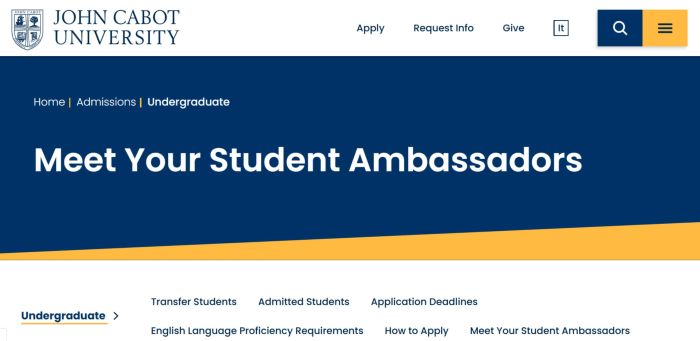
Source: John Cabot University
Academy of Applied Pharmaceutical Sciences
Smaller career-focused colleges also leverage ambassadors. The Academy of Applied Pharmaceutical Sciences (AAPS) in Toronto uses student ambassadors in marketing-savvy ways by showcasing student and alumni success stories. AAPS regularly celebrates Student Success Stories: for example, posting when an alumnus lands a dream job in the pharmaceutical industry. These stories (often shared on AAPS’s website and social channels) let prospects “see themselves achieving their goals” at the college.
In essence, AAPS ambassadors become living proof points of outcomes, saying “look what our students achieve; you can join them.” Ambassadors share their journeys and tips (on Facebook, YouTube, LinkedIn, etc.), adding authenticity to recruitment. The key is that AAPS selects enthusiastic storytellers proud of their field, so their posts come off as peer-to-peer endorsements of the college’s programs. This example shows that digital ambassador content doesn’t always mean live chats; even a series of student highlight posts with quotes and photos can serve as powerful testimonials.
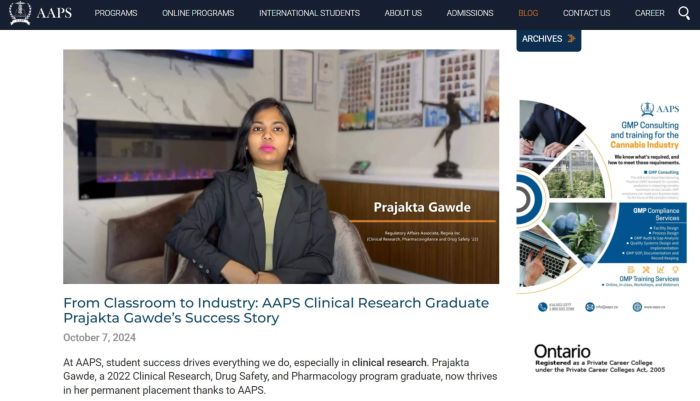
Source: AAPS
Terry College of Business, University of Georgia (USA)
Business schools often rely on ambassadors to convey the program’s culture to applicants (for MBA or undergraduate business programs). The Terry College of Business at UGA has a team of Terry Ambassadors who exemplify leadership and community-building. Their mission statement: “Leading by example, ambassadors engage with students and alumni to build community within the college, increase understanding of opportunities available, and further the Terry legacy.”
This highlights how ambassadors at a business school not only assist with recruiting new students but also serve as connectors among current students and alumni – bridging different parts of the community. Terry Ambassadors are selected for attributes like strong academic records, interpersonal skills, and dependability. They uphold values such as integrity, respect, and servant leadership, acting as role models.
In practice, they host networking events, speak with prospective business majors about career opportunities, or welcome alumni back to campus. The benefit is two-fold: prospects get insiders’ perspectives on the program, and the ambassadors themselves gain networking and leadership experience (Terry explicitly notes ambassadors “develop a strong network of peers, alumni and professionals” as a benefit of the role. This example shows a slightly different angle – ambassadors not just for admissions, but for fostering pride and connections within a college community.
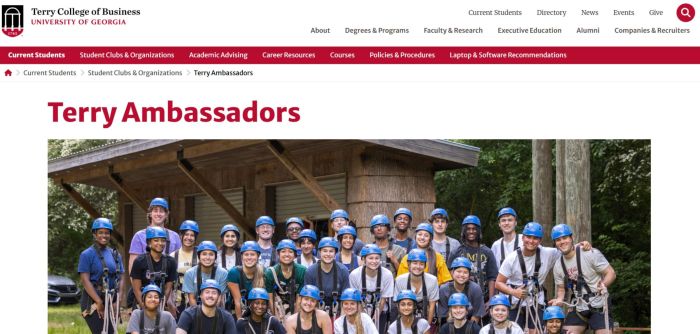
Source: Terry College of Business
Middlebury Language Schools
Specialized programs like language immersion schools use ambassadors. At Middlebury’s famed Language Schools, former students act as student ambassadors to share their experience with prospective enrollees.
For example, the Japanese Language School has student ambassadors listed with their emails so interested students can reach out to ask about the immersion program. These ambassadors answer questions like “What surprised you about your experience?” and “How much did your Japanese improve?”, giving honest testimonials about the intensive summer program. This helps prospects, who might be nervous about the immersion pledge, hear directly from peers who succeeded.
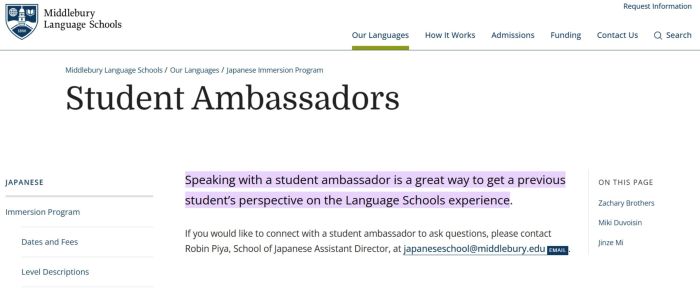
Source: Middlebury Language Schools
The ambassadors in this context need to be candid and reflective, able to articulate how they overcame challenges and why the program was worth it. Their enthusiasm for language learning and personal growth becomes a selling point for others. It’s a great example of how even non-traditional educational settings leverage peer ambassadors to build trust – after all, who better to convince someone to spend a summer speaking only Japanese than a student who did it and loved it?
Bishop O’Dowd High School
High schools also use student ambassadors, often in admissions tours or as “student hosts.” Bishop O’Dowd, a Catholic college-preparatory high school, actually has an army of nearly 400 student volunteers in its ambassador program – affectionately nicknamed the “Dragons” (after the school mascot). According to their admissions director, this large-scale program has been “transformative for the campus culture itself”. With so many students involved, it created “a culture of positivity and a willingness in students to truly engage” on campus.
Ambassadors at O’Dowd not only assist with tours and open houses, but by telling their personal stories to visitors, they have also become more reflective and positive about their own school experience. This is a powerful insight: a well-run ambassador program doesn’t just benefit the admissions office; it can fundamentally boost student morale and leadership school-wide. The key qualities for these youth ambassadors include being outgoing, responsible, and service-oriented – essentially, being proud “Dragons” who want to share that pride.
For younger students (high schoolers), being an ambassador also instills college and career-ready skills early on, such as public speaking and collaboration. Bishop O’Dowd’s example demonstrates how scale and inclusivity (hundreds of ambassadors representing all types of students) can amplify impact: every prospective family can meet a student who resonates with their child’s interests or background.
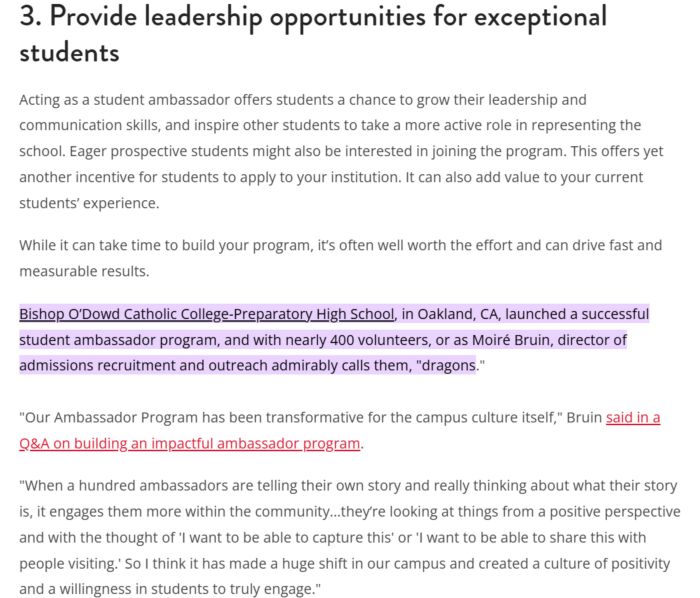
Source: Bishop O’Dowd High School
Empowering Students as Digital Ambassadors
A great digital student ambassador is more than a smiling face on a brochure. They’re a communicator, a leader, a tech-savvy problem-solver, and, most importantly, a genuine student voice. They bridge the gap between your institution and prospects, turning formal marketing into an authentic human connection.
And the proof is in the results. When the University of Guelph launched its student social media ambassador program, engagement skyrocketed: 45% more interactions on Twitter and a 560% surge in Instagram likes, all in the first semester. Why? Because prospects trust real students sharing real experiences.
In conclusion, choose ambassadors who radiate positivity, connect easily with others, and navigate the online world with confidence. Give them the training they need, social media best practices, Q&A techniques, but don’t strip away their personality. Authenticity is their greatest asset, and when they’re free to speak in their own voice, it resonates far beyond what any scripted message can.
For students considering the role, here’s your sign to go for it. If you naturally talk about your school with enthusiasm, becoming an ambassador is simply channeling that passion into impact. You’ll build leadership skills, expand your network, and help future students feel at home before they even arrive.
In the end, the formula for a great digital ambassador is the same as for any ambassador: a sincere desire to help, connect, and inspire, supercharged by the reach of digital media. When schools and students partner in this way, everyone wins. Students grow as leaders, institutions gain their most credible advocates, and prospective learners get the authentic, peer-to-peer insight they crave. In an age where trust drives enrollment, investing in student ambassadors is investing in your most powerful recruitment asset: your own students.
Frequently Asked Questions
Question: How would you describe a student ambassador?
Answer: A student ambassador is a representative of their institution who shares authentic experiences, supports prospective students, and fosters a welcoming community. They act as a bridge between the school and its audience, answering questions, giving insights, and promoting campus culture through personal interaction, events, and digital engagement.
Question: What makes a good ambassador?
Answer: A good ambassador is authentic, approachable, and knowledgeable, with strong communication skills. They represent their institution with enthusiasm, build trust through genuine connections, and adapt easily to different audiences and platforms, ensuring every interaction leaves a positive, lasting impression.
Question: What is a digital ambassador?
Answer: A digital ambassador is a student representative who promotes their institution online through social media, live chats, and virtual events. They share authentic experiences, answer questions, and create engaging content, helping prospects connect with the school community, even if they can’t visit campus in person.







